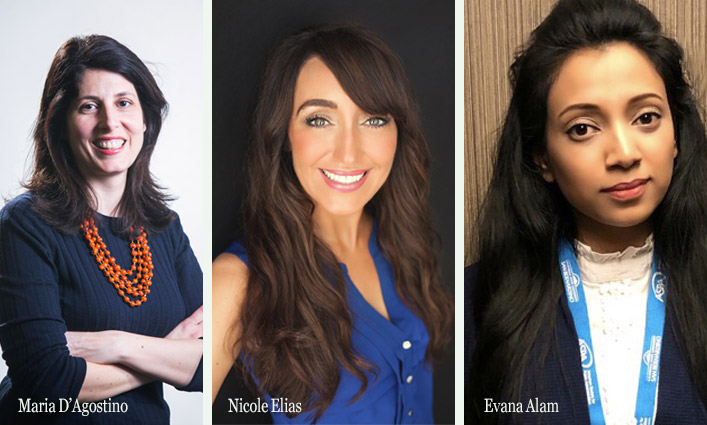
“We hope that this research will get us closer to gender justice by educating, engaging, and fostering a consortium of students, faculty, public service practitioners, and community members interested in women in public service.”—Professor Maria D’Agostino
Honored about being one of the first recipients of the 2018-19 Inaugural Presidential Student-Faculty Research Collaboration Award, Maria D’Agostino, Associate Professor of Public Management and Nicole Elias, Assistant Professor of Public Management, have started their research project. Co-founders of Women in the Public Sector (WPS), a John Jay organization dedicated to addressing gender issues in public service, the professors have titled their project Gender Equity in Municipalities. The goal? To teach students about how to address gender equity differently. “Our student-faculty research collaboration examines how municipalities are addressing gender equality through three learning objectives that contribute to student success, developing knowledge of gender equity; building and applying research skills; and participating in mentorship and professional development for future opportunities,” said D’Agostino. “We hope that this research will get us closer to gender justice by educating, engaging, and fostering a consortium of students, faculty, public service practitioners, and community members interested in women in public service.”

“What is most exciting about working with students is their energy and passion for the projects as they determine which career path to pursue.” — Nicole Elias, Assistant Professor
Looking forward to the collaboration, Elias couldn’t help but state her eagerness to work with John Jay students. “WPS has worked with over 13 students since 2013. We view students as collaborators who bring valuable insights and experiences to projects,” said Elias. “What is most exciting about working with students is their energy and passion for the projects as they determine which career path to pursue.”

With one student already selected—Evana Alam (’20), a master’s in Public Administration graduate scholar—D’Agostino and Elias, are still searching for other students to participate. Hoping to encourage her fellow John Jay classmates to take part in the research, we spoke with Alam, to learn more about her goals for the project, what this collaboration means to her, and what advice she has for other John Jay students.

What do you hope to accomplish with this research?
I’m working with the co-founders of Women in the Public Sector, Maria D’Agostino and Nicole Elias and other students to gather information on how municipalities determine gender equality. To do this, we will be using three objectives, which are developing knowledge of gender equity, building and using research skills, and taking part in mentorship and professional development. By the end of this project, my hope is that we have raised awareness about gender equity issues within public service.
Why are you interested in participating in this specific research collaboration?
I was born and raised in Bangladesh, where women are discriminated in the workforce. There are glass ceilings on almost every sector in the country. Females in the workforce face discrimination when it comes to receiving promotions, salary increases, and job offers compared to males. In addition, women are viewed as incapable of performing in male-dominated fields. By participating in this research collaboration, I hope to raise awareness, so that women in countries like Bangladesh can experience their full range of rights and freedoms.
“By participating in this research collaboration, I hope to raise awareness so that women in countries like Bangladesh can experience their full range of rights and freedoms.”—Evana Alam
Have you worked with these professors before?
I worked under the supervision of the professors through their organization, Women in the Public Sector. In 2018, I participated in the American Association of Public Administration at Denver, Colorado with the WPS team. We organized a workshop geared towards gender equity in the public sector workforce. That was my first public administration conference and I enjoyed meeting various academics from around the country and learning more about their research. This conference got me thinking about the research that I would do for my graduate program.
Why is it important to have these collaborations between students and faculty?
Student-faculty collaborations help to foster strong relationships while learning. Students and faculty have different viewpoints on issues affecting gender equity. Therefore, this collaboration will allow the team to share their ideas and see things in a different light. The collaboration allows for a deeper bond between students and faculty through the engagement of high-quality research skills. By working with faculty, students would also be able to learn more about themselves. For example, I hope to learn how to advance my research methods outside of the traditional education I received as an undergrad.
How do you hope this research will help move the needle forward in terms of justice?
Gender equality has been a longstanding problem throughout the world. Hopefully, through our research and the collaboration between students and faculty, this issue will gain the attention of students at John Jay College, who will impact society with their work. These crucial topics can ultimately lead to policy change in the United States and elsewhere in the world.
“If you are directly impacted by an issue, make it your priority to learn as much as you can about it and use that knowledge to become a catalyst for change.”—Evana Alam
What advice do you have for other John Jay students—especially younger students—who may be interested in participating in a research project similar to this one?
I believe that challenging yourself and gaining mentorship from faculty will increase your skills and offer opportunities to develop yourself professionally and academically. Nevertheless, if you are directly impacted by an issue, make it your priority to learn as much as you can about it and use that knowledge to become a catalyst for change.



